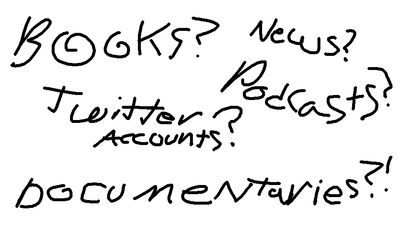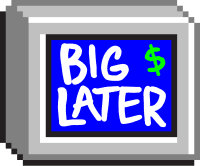Big Later is a super nice starting point.
We fancy ourselves as the ideal starting point for any young person who wants to invest. For the folks that get through 25 glorious days with Big Later, you’ll have your budget sorted, you’ll know all about which accounts will minimize your tax burden, and you’ll be fully briefed on the merits of investing with low fee ETFs and index funds. The overachievers will even have automated their monthly contributions (don’t rub it in).
If you find yourself experiencing a tingly “my interest is piqued and I want to keep learning” sensation, here is my personal guide for adding breadth and depth to your knowledge of finance, investing, and markets. If the tingling is accompanied by a burning sensation, see a doctor immediately.
A caveat before we go further
Everything listed below got its place because it feeds intellectual curiosity, NOT because it will help you beat the market. Yes, knowledge is power, but know your place on the Dunning-Kruger curve.
Podcasts
Experts are out there, putting their knowledge on display, putting information in context, and keeping it conversational. For me, podcasts usually generate a long list of things that I want to look into afterward. They help me focus on a particular aspect of markets/business/investing, and then the onus is on me to make sure I understand what’s discussed.
Personal favorites:
- Invest Like the Best
- The Meb Faber Show
- NPR’s Planet Money
The first two might feel heavy at first; lots of new terms and concepts. Write them down, google them later, keep at it. You’ll notice that after 5 or so episodes, most of the information will stick the first time and you won’t feel like Brint and Meekus anymore.
Newsletters
Staying up to date on current events with market-focused newsletters is a great way to stitch together your own patchwork quilt of perspectives. Since we’re not day-traders, current events shouldn’t make too much of an impact on our investment strategy, BUT, looking at world and business events through the lens of the market is a good way to add some depth to your worldview.
- Market Crumbs
- Financial Samurai
- A Wealth of Common Sense
- The Hustle
Books
Before the internet and blogs and vlogs and podcasts, people wrote books (or so I’ve heard). There is a wonderful canon of financial literature out there! This is far from comprehensive, but here are a few I’ve personally enjoyed plus a few that are on my list:
The “Classics”
- The Intelligent Investor — Benjamin Graham
- The Little Book of Common Sense Investing — John Bogle
- Rich Dad, Poor Dad — Robert Kiyosaki
- The Essays of Warren Buffett: Lessons for Investors and Managers — Lawrence Cunningham
- Liar’s Poker — Michael Lewis
- What Works on Wall Street — James O’Shaugnessy
- The Great Depression: A Diary — Benjamin Roth
Other not-oldies-but-goodies
-
The Psychology of Money— Morgan Housel
- Millennial Money — Patrick O’Shaugnessy
- The Big Short — Michael Lewis
-
The (Mis)Behavior of Markets — Benoit Mandelbrot (for the mathematically-inclined)
Fintwit (financial Twitter)
A well-curated Twitter feed is one of those things that’s genuinely hard to put a price on. You’ve got the absolute best in the business sharing their honest opinions in a public forum multiple times a day! How is that free??!? I was fortunate enough to have a close friend with a great mind for the markets share his curated list with me, and so now I’ll share it with you (with a few of my own additions):
- @patrick_oshag
- @jposhaughnessy
- @dollarsanddata
- @ReformedBroker
- @BrianFeroldi
- @APompliano
- @TheStalwart
- @morganhousel
- @InvestorAmnesia
- @hussmanjp
- @EricSTownsend
- @jasonzweigwsj
- @Hipster_Trader
- @michaelbatnik
Keep this in mind: Fintwit should make you feel (occasionally) less confident about what you think you know. It should make you realize just how complex the market is and how challenging it is to beat — even for the smartest, most experienced investors. Everyone listed puts something along the lines of “not investing advice” in their bio. Take that to heart.
Remember…
These resources are meant as a springboard for the folks who go through Big Later and want to go deeper. If you make it through and get that “that was the right amount” feeling, then we did our job and you can call it a day. However, we’d be remiss not to provide some additional guidance to anyone who cared to take a deeper look down the rabbit hole…
Happy learning!



